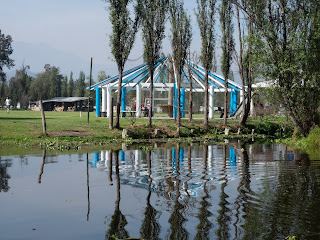Our guide, Ricardo was passionate about this project. He does these tours for the Culinary Backstreets Food Tour Company and is actually working a piece of land and that is where we stopped to see how the farming was done. He also helps a group of about 40 farmers figure out the farming technique and how to get their crops to market.
The Xochimilco is a centuries old method of farming. It was originally a shallow lake. They have made Chinampas or islands by dredging up the mud on the bottom and surrounding these islands with trees that have a horizontal root structure. They have also used pieces of wood to contain the dirt.
Our guide, Ricardo.
So now it is a system of canals around many islands. It is a UNESCO heritage site. No one lives on the land, but they have put up simple structures. And even house some animals there. Notice the wood "fence" as well as the trees surrounding the islands.
But it is hard work being a farmer - much easier to make money by fixing it up for soccer. On the weekends a lot of games are played here. Everyone has to travel by boat.
Transportation for some local farmers.
Most all of the work is done by hand. But plowing can be done by tractor. The barge below is used to transport these large pieces of equipment.
The next two photos are of Ricardo's plot. He is inside one of the hot houses. The little squares of dirt surrounding him contain tiny seedlings. This dirt was dredged up from the lake bed. The soil has a lot of nutrients and also the dredging makes it possible for the farming to continue. If it wasn't done the lake would soon fill up and dry out.
An interesting plant.
Ricardo's wife served us home made tamales. This was our first tasting of the day.
Farmers taking there produce to market.
As we were going back to the dock this boat of Maherachi singers pulled up next to us. They would serenade you for a fee.
Back on land, we head off to Mercado Xochitl. Our next stop was in front of the mercado to taste a favorite here - an old strain of blue corn. You can have it on the cob slathered with a mix of mayonnaise, dry cheese and chili powder for a little kick. You could also have it in a soup - the corn already stripped from the cob. Both were good.
Lots of food available inside the mercado. Lots of meat products. That is chicharron on the right.
Below is tripe or cows stomach lining. There is a picture almost at the bottom of this post of Menudo, which is a soup made from tripe.
We headed out of the mercado towards the lane where the farmers sell their products. Miscellaneous church below.
Below are some of the farmers that Ricardo is trying to help. The vegetables look especially large and delicious.
A farmer and daughter enjoying each other.
Mushrooms.
One ingredient that is favored here is corn with Huitlacoche. This is a fungus that causes each kernel of corn to grow large and disfigured.
A large bowl of guacamole that is sold in 6 ounce cups.
A tortilla maker - you get the typical thin evenly sized tortillas.
Mole is a big thing here. We tasted all of them.
Pickled items and garlic.
A stand selling fresh fruit waters of many different flavors. The guy was very friendly, wanting to shake everyone's hands.
This little girl was carrying her baby doll so carefully I just had to take a picture of her. And yes, it is the baby Jesus.
And here is the promised Menudo photo.
Candied fruit is a big thing here.
And in one of the exits was a row of ladies with their homemade tortillas. Most of them were smaller and much thicker than the ones made by the machine.
A last shot of the park across the way.


















































Love all your wonderful pictures!!
ReplyDeleteoh man that food looks incredible! One could have a worse job than being the person who determines which places get a UNISECO world heritage site designation
ReplyDelete